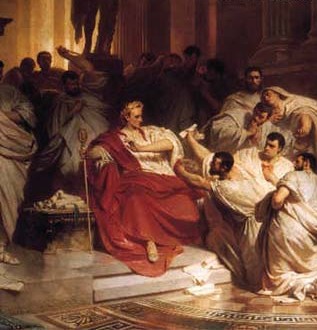
I’m sure you’ve heard the expression “Beware the Ides of March.” You’re probably even aware that it’s to do with Julius Ceasar. It is part of Shakespeare’s play, Julius Ceasar. A witch foretells Ceasar’s death on the floor of the Senate in Rome, on the 15th of March, and tells him to “Beware the Ides of March!”
Julius Caesar was, in fact, murdered by Brutus, Cassius and a few other conspirators in the Senate on March 15th, 44 B.C. Two thousand and fifty-six years ago today. It marked the end of one of the most influential generals, dictators and strategists the world has ever seen.

It is because of Caeser, for instance, that North Americans and most of Europe drives on the left hand side. Still. Up until Caesar ruled Rome, everyone drove on the right hand side of the road, because charioteers used their whips in the left hand, and driving on the right avoided whipping people travelling on foot.
Before Caesar came to power, even Britain was conquered and the rule of driving on the right instituted.
But Caesar was left handed and when he came to power, he insisted that wherever he travelled (and he drove his own chariot), everyone use the left side of the road.
But Caesar never reached England, and so in England (and Australia, which was colonized by England, plus the West Indies, India and other ex-English colonies) still drive on the right hand side of the road.
For a while, too, everyone drove on the right in the American colonies, but during the War Of Independence, the colonists changed to driving to the left, European-style.

But this is just a minor example of the huge influence Caesar had over world politics and power. He almost doubled the extent of Rome’s holdings in Europe and Asia, and was the guiding figure behind Rome`s change from a republic to a mighty empire.
The Roman senators killed Caesar in an attempt to return Rome back to what they thought of as the glorious days of the Republic, but after his assassination, Rome descended into a series of petty civil wars and strife. It never retrieved the majesty that Julius Caesar had won for it.
How different would the world be today if Julius Caesar had never existed? If he had, say, died of a childhood disease?…or been killed when he was very young. Would Rome have never become the giant influence over the world that it has been? We call this month March because of Rome’s influence – in fact, most of the names of the months of the year come from the names of Roman gods. March is from Mars, the Roman god of war.
It’s this very interesting question that drives some of the action in the third book in the Beloved Bloody Time series. If you’ve read Byzantine Heartbreak, you’ve caught a glimpse of this storyline already, when Demyan’s time marker for ancient Rome is stolen (I can’t be too much more specific than that, or I’ll spoil things).
_________________________